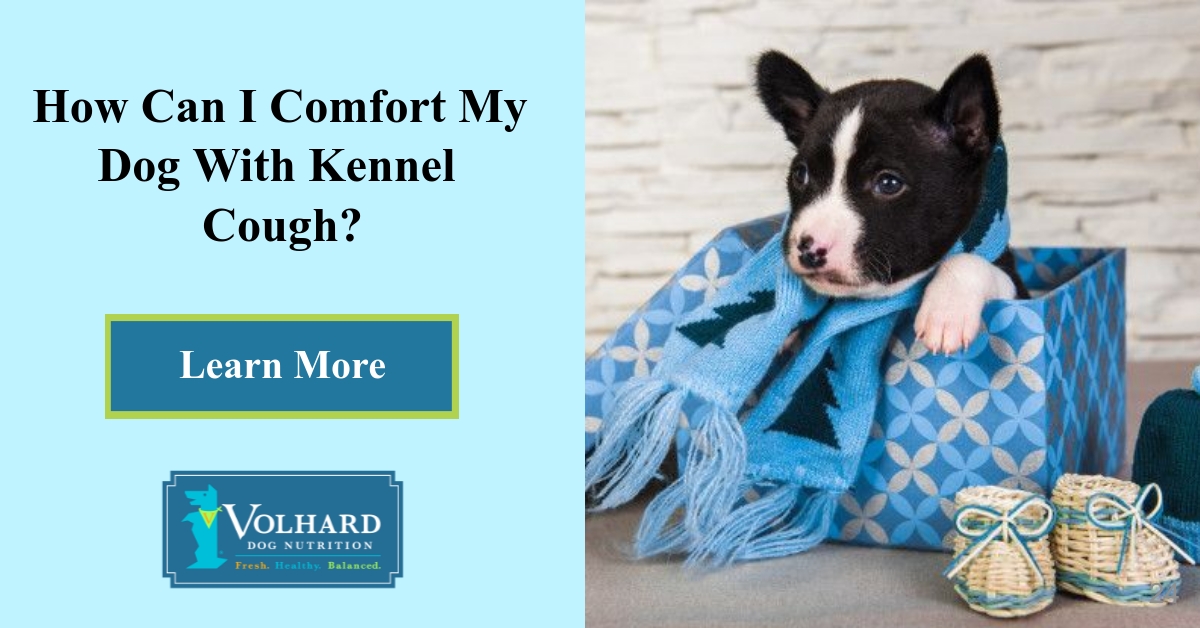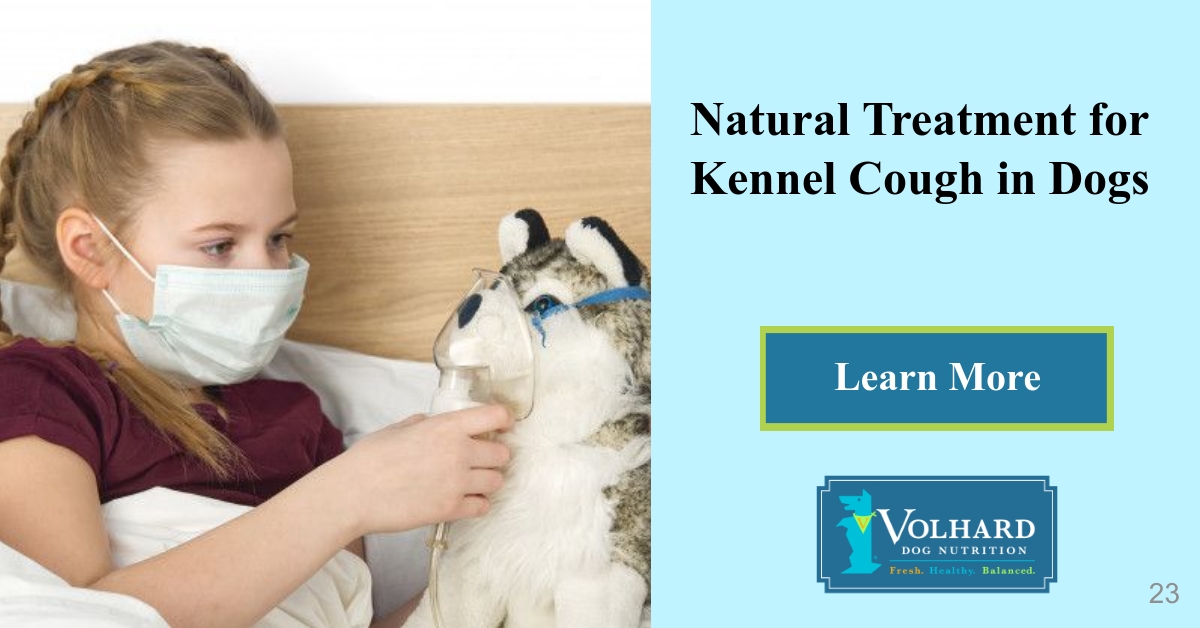Helping Your New Dog Overcome Kennel Cough With a Proper, Nutritious Diet
Posted by Volhard Dog Nutrition on Dec 16th 2020
The prospect of a canine companion entering your family is always exciting—the thought of a new furry mate playing and keeping a watchful eye on our children brings joy to every dog owner’s heart. However, let’s not forget the fact that dogs are more than just playful mates: it is our responsibility to feed, nurture, and keep them safe.
Not any different from humans, dogs are vulnerable to certain contagious diseases, especially when they are exposed to other dogs, a thing we all experience when taking the bus or walking on a crowded street.
If your new puppy is constantly hacking away or making noises similar to choking, it might experience something we call kennel cough, a respiratory disease that can be passed from animals to humans on rare occurrences.
Here at Volhard, our mission is to ensure a healthy life for your canine friend through a proper, well-rounded diet.
Today, we are dedicating this article to the subject of how an adequate diet composed of some key ingredients can help your dog’s immune system neutralize kennel cough and keep your entire family healthy and happy!
What is Kennel Cough?
As we mentioned earlier, kennel cough is an airborne, highly contagious upper respiratory infection that causes inflammation in the trachea and the bronchioles accompanied by a dry, hacking cough.
The disease can be contracted practically anywhere two or more dogs are gathered.
The most common kennel cough symptom is a persistent, dry cough, which can persist during night time, with more severe symptoms, such as lethargy, loss of appetite, and fever.
Although kennel cough is not necessarily life-threatening, the symptoms themselves reduce the quality of life for both infected dogs and humans, a good reason for any dog owner to speed up their dog’s healing process as much as possible.
What Causes Kennel Cough?
Numerous viruses, akin to the common cold that humans experience, can cause the kennel cough.
Most of the time, dogs developing this disease are infected with multiple viruses or bacteria at the same time (mycoplasma, canine adenovirus, canine herpes virus, etc.), which makes it harder for us to establish its main cause.
However, in many cases, we can identify the culprit as a bacterium called Bordetella Bronchiseptica (which is another name for the disease itself).
Once inhaled, these bacteria or viruses attach themselves to the respiratory tract, which loses its mucus coating under the influence of specific factors - mucus impedes particles from causing infections of the larynx and trachea.
Some of the most common factors are exposure to cigarette smoke and dust, stress, cold temperatures, and living in crowded and/or poorly ventilated areas, such as in kennels and shelters.
Neutralizing the Kennel Cough With Natural Ingredients
The truth is, your puppy’s immune system can and will learn to fight against kennel cough by itself—the only thing it needs is a helping hand!
While medical treatments are available for this disease, there is a more natural way to neutralize kennel cough—all it takes is for you to add the right ingredients to your dog’s diet.
Let’s explore these ingredients, as well as their benefits:
Ingredient #1: Honey
This rich source of antioxidants and enzymes is at the top of our natural kennel cough cure list.
It is considered almost a complete food containing protein, carbohydrates, iron, copper, potassium, and numerous vitamins, such as vitamins C, D, and E.
With its antibacterial properties, honey soothes your dog’s throat, minimizing coughing.
The healthy amount of honey for your dog mostly depends on its size—in most cases, 1 tablespoon of honey per day will suffice; in some cases, 2 tablespoons might be appropriate.
However, you must feed your dog only raw honey since heat processing kills the health-giving enzymes it contains.
For easy ingestion, mix the honey with a bit of warm water in a bowl.
Another helpful suggestion would be to run your spoon under hot water to make the honey slide off the spoon into your dog’s mouth.
Ingredient #2: Coconut Oil
Another superfood that makes our natural remedy list is coconut oil.
Its well-documented antiviral properties help neutralize viral infections both for dogs and humans.
Following a treatment composed of 2 teaspoons of coconut oil per day will help reduce the cough.
Moreover, if your dog is experiencing a loss of appetite, coconut oil is even more recommended: its wonderful smell and pleasant taste will restore your dog’s appetite immediately.
Ingredient #3: Cinnamon
With its antiviral agents, a daily half spoon of cinnamon will not only ameliorate the cough but also help neutralize the infection.
Aside from kennel cough, cinnamon can also be used to combat more dangerous bacteria, such as E. coli.
Since dogs are not familiar with the cinnamon smell and taste, your canine friend might not be excited to try out this spice. In that case, sprinkle the cinnamon over your dog’s food.

Hints and Tips for a Quick Recovery Process
Bringing these changes into your dog’s diet is only half the process—several other hints and tips will bring your furry friend’s healing process to completion!
Let’s take a look at the following list of examples:
- Some other ideas using essential oils, thanks to one of our Affiliates, Dana Brigman, could be to diffuse RC (this is made by Young Living) or eucalyptus in the room with the dog using a rotation schedule.
- Another way to get the aroma to the dog would be to place a drop or two on a bandana to take on and off.
- You can also use gel caps coated with coconut oil of thieves, thyme, Copaiba.
- Chest rub of animals scents ointment with eucalyptus, or RC, Thieves.
Note: Some of the success using essential oils will depend on the severity, size of dog, etc.
- Make sure that your dog enjoys enough resting time.
- For diminished coughing spells, keep your dog away from strenuous exercise.
- Using a harness rather than a collar will reduce the amount of pressure on the irritated trachea and, implicitly, coughing.
- Keep your dog away from smoke sources, such as cigarettes, fireplaces, and campfires.
- Place a humidifier near your dog when it is resting—the moisture in the air will help the respiratory tract irritation.
Conclusion
Welcoming a new member to your family is always a beautiful moment, and it should not be spoiled by an unwelcome cough.
Here at Volhard, we advocate for dog owners to look for a natural approach to nutrition, which will help dogs thrive and enjoy their lives.
Are you on a quest to find the perfect natural diet for your pup? Feel free to contact us or check out our blog!
Volhard Dog Nutrition and its expert nutritionists are now offering online consultations to help more dog parents discover why, what, and how to feed their dogs the healthiest of foods! Speaking to a Volhard nutritionist will help you understand the inseparable relationship between healthy food, a healthy body, and a healthy mind. If you're interested in contacting one of our Volhard nutritionists, don't hesitate to access our consultation page!



